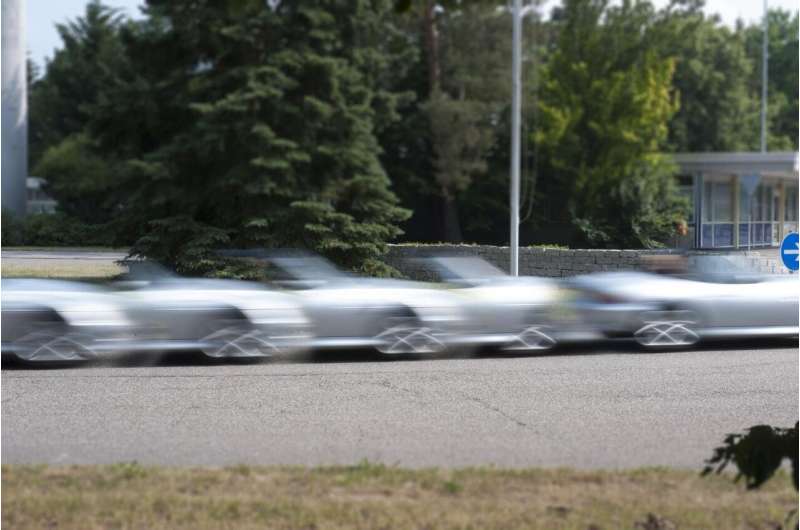Thinking about future mobility and production engineering

Transport paths of people and goods are the main arteries of our networked society, locally as daily used commutes or globally as international merchant shipping routes on the oceans. Classical transport means, however, no longer appear viable in times of urbanization, resource scarcity, and climate change. For this reason, the State of Baden-Württemberg now funds the Innovation Campus "Future Mobility" (ICM) of Karlsruhe Institute of Technology (KIT) and Stuttgart University. It will break new ground to enable ideas and business models for future sustainable mobility. The ICM is a main element designed by the Ministry for Science in the "Strategic Dialog for the Automotive Sector in Baden-Württemberg."
It is the goal of the ICM to create new, pioneering technologies in the areas of mobility and production through excellent fundamental research. The first two pilot projects, hence, will cover zero-emission drives and additive manufacture, i.e. use of 3-D printers not only for high-quality and operational (lightweight) components. KIT and Stuttgart University pool their competences to think about and interdisciplinarily study new forms of mobility, flexible production technologies, and future value networks.
"Our innovation campus will be the pioneer for modern mobility," underscores Theresia Bauer, Baden-Württemberg Minister for Science. "Based on the excellent research and know-how of Karlsruhe and Stuttgart, future mobility will be studied and developed, from traditional automotive and suppliers industries to providers of sustainable mobility services."
"Many wishes and expectations are associated with future mobility: it is to be comfortable and inexpensive, interconnected and sustainable, safe, accessible and quick, autonomous and robust," summarizes the President of KIT, Professor Holger Hanselka. "KIT and Stuttgart University will now work on concepts and technologies that will make these wishes come true and, in this way, respond to a great challenge facing society."
The Rector of Stuttgart University, Professor Wolfram Ressel, emphasizes: "The Innovation Campus "Future Mobility" is the joint technology platform of both universities to study new and innovative solutions. These solutions will then be tested on a prototype scale in a real-world laboratory within the framework of our zero-emission campus initiatives."
"The Innovation Campus Mobility addresses the necessary imminent transformation process in the mobility sector and the corresponding production technology," says KIT Vice-President for Innovation and International Affairs, Professor Thomas Hirth. "We want to develop the corresponding concepts and models and rely on our scientific excellence, interdisciplinary fundamental research, and new innovation processes."
"KIT and Stuttgart University share the vision of the Innovation Campus offering experimental space for viable mobility solutions," adds Professor Peter Middendorf, Vice Rector for Knowledge and Technology Transfer of Stuttgart University. "Here, we want to encourage development of disruptive ideas that will also reach industry via graduates, startups, and collaborations."
Phase One: Additive Manufacture and Zero-emission Drives
The ICM will enter the first phase by focusing on "additive manufacture" and "zero-emission drives." Work will concentrate on the vision of digital production based on an entirely flexible production technology. In this way, products can be produced locally, if necessary, in the short term, with high quality, inexpensively, and in any small numbers. Moreover, additive processes can help reduce emissions of drive systems, as they help save weight, space, material, and energy or combine functions of various components. Zero-emission vehicles and mobility concepts using digitization lead to more efficiency in the use of resources and transport space. By means of prototypes, e.g. safe, smart, comfortable, single-seated commuter mobiles for short distances, the concepts of the first phase will be validated and demonstrated. Focuses in the next phases will be identified together with the scientists involved, external experts, and within the framework of a think tank.
The Innovation Campus Mobility is a joint initiative of KIT and Stuttgart University to enable groundbreaking ideas and innovations. For this, entirely new approaches of "fail fast and often" will be pursued quickly and flexibly. It will identify industrial fields that will be important in future, create cooperation places as well as innovation and founding culture, promote young talents, and integrate research in Baden-Württemberg.
In the "Innovation Campus Future Mobility—Research for Future Sustainable Mobility," researchers from Karlsruhe and Stuttgart working in the areas of vehicle technology, product development, production technology, chemistry, materials, electrical engineering, aircraft construction, and machine tools will collaborate. In addition, projects of other universities and research institutions in Baden-Württemberg may be integrated depending on the topic. The Baden-Württemberg Ministry for Science, Research, and the Arts funds the ICM with EUR 10 million over five years. In addition, young investigators groups will be set up and professorships for "Laser Systems Technology" and "Digitization of the Development of Materials and Processes for Additive Manufacturing" will be funded at Stuttgart University and KIT, respectively, for a duration of ten years.

















